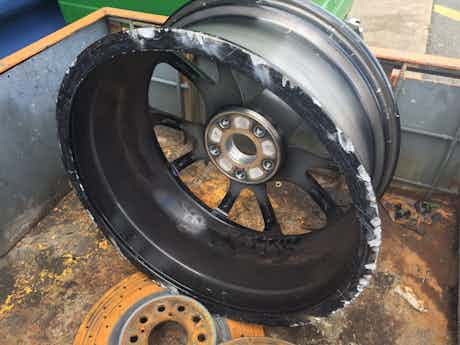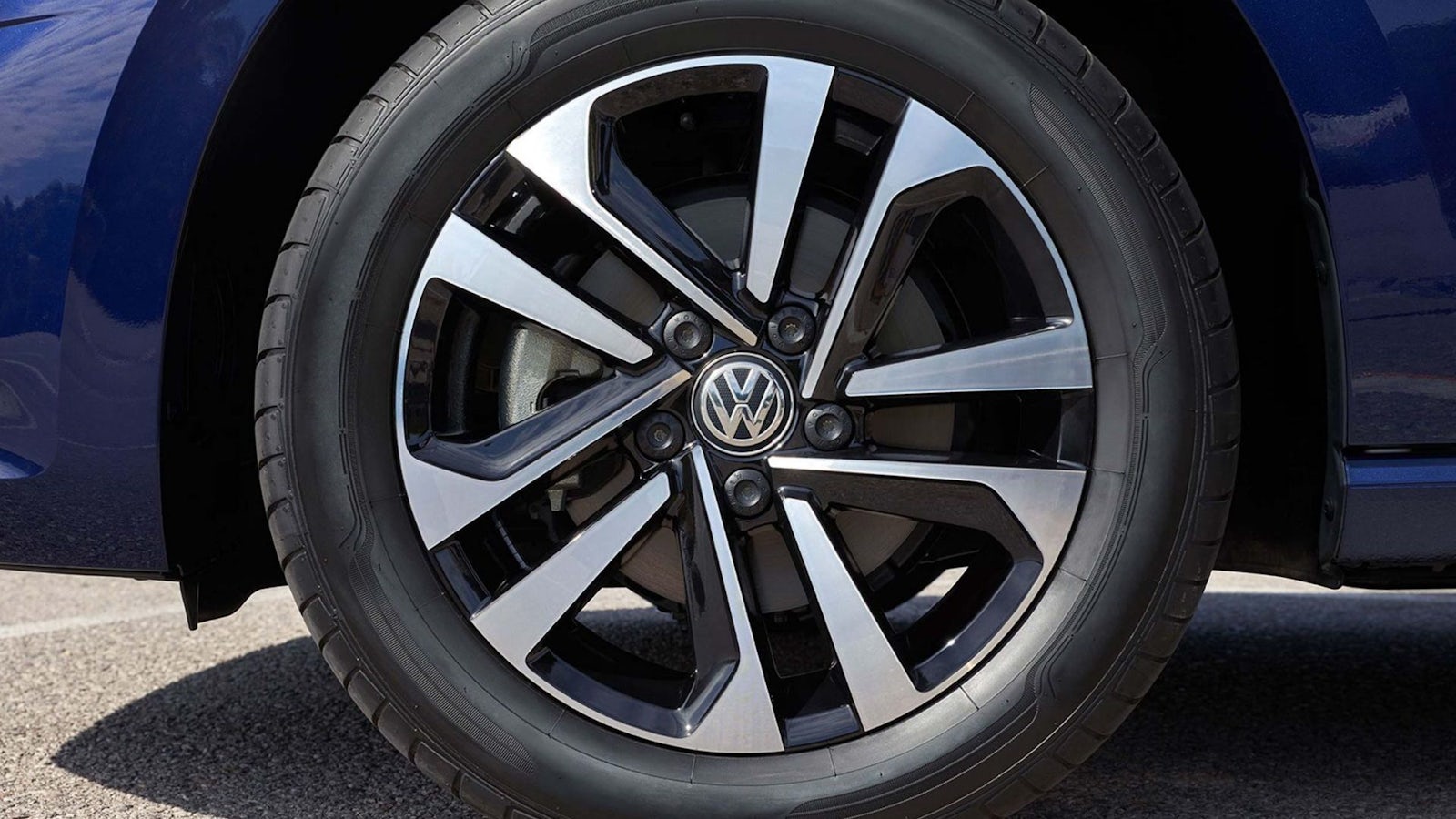Tyre and alloy insurance: what is it and is it worth it?
January 12, 2024 by James Allen

Even on the most comprehensive car insurance policies, there may be areas that aren’t covered, and alloy wheels and tyres are usually on this list. Handily, there are insurance providers out that do offer insurance services for tyres and alloy wheels.
However, it is important you read the fine print and make sure you know exactly what’s covered before signing on the dotted line. Read on for a full breakdown of tyre and alloy wheel insurance, and don’t forget that you can buy your new car through Carwow and get a a price you can be confident won’t be beaten.
What is alloy wheel insurance?
As the name implies, alloy wheel insurance provides cover specifically for your car’s alloy wheels. Should your shiny alloys get scraped or scratched during an ill-judged parking manoeuvre, the alloy wheel insurance softens the blow when the repair bill comes through.

Just like your main car insurance policy, alloy wheel insurance comes with an excess amount that you’ll need to pay yourself in the event of a claim. Excess payments for alloy wheel insurance generally start from around £10.
Also like your main car insurance policy, there are plenty of terms and conditions buried in the paperwork, and there are specific things that are often included and excluded in alloy wheel cover policies. Below is a general overview of what is and isn’t typically covered in an alloy wheel insurance policy.
What is included in alloy wheel insurance?
- Alloy wheel refurbishment – your policy will cover the costs of alloy wheel refurbishment, up to a specific amount. The exact amount will be outlined in the insurance policy’s terms and conditions.
- Multiple refurbishments – Many alloy wheel insurance providers will allow you to make multiple refurbishments claims over a specific time period. Do bear in mind the exact time duration and the amount of times you can claim for alloy wheel repair costs does vary between insurance providers.
- Replacement alloy wheel contributions – if your car’s alloy wheels are beyond repair, the insurer may be able to contribute towards the cost of a replacement wheel.
What is excluded from alloy wheel insurance?
- Pre-existing damage – you won’t be able to claim on your alloy wheel insurance to cover any repair or refurbishment costs if the wheels were already scuffed or scratched.
- More complex alloy wheel repairs – some alloy wheel insurance providers may exclude alloy wheels with specific styles and finishes. Make sure you read the terms and conditions of the policy before committing to it.
- Replacement alloy wheels – while some providers contribute to the cost of replacement alloys if refurbishment isn’t possible, don’t expect to find a policy that will cover the whole cost for replacement alloys.
- Repairs for non-original wheels – if the alloy wheels aren’t the ones that came with the car when it was brand new, they likely won’t be covered by your alloy wheel insurance policy.
- Multiple refurbishments per claim – typically, each refurbishment claim will be on a per-wheel basis. For example, if two of your car’s alloys need to be repaired, this will tend to be classified as two claims rather than one, even if you report them both to your insurer at the same time.
What is tyre insurance?
Because tyres are items that will wear out over time and use, you won’t be able to claim for new tyres on their insurance once they’ve run out of tread. However, you can use tyre insurance to mitigate the effects of unforeseen reasons, such as if you get a puncture or a vandal decides to slash your car’s tyres.

Much like alloy insurance, tyre insurance policies will typically have a low excess cost and should let you make multiple claims up to a pre-specified amount over the course of the cover period, which provides a bit of peace of mind on the off-chance you need to make more than one claim within a short timeframe.
With tyre insurance, there are also instances and scenarios that will or won’t be eligible for insurance cover. Below are examples of the sort of cover you will be able to expect from many tyre insurance providers.
What is included in tyre insurance?
- Accidental damage protection – if your car gets a puncture, you’ll be able to claim on the insurance to mitigate against the costs of buying a replacement tyre.
- Malicious damage protection – if your tyres are stolen or damaged in a criminal act, you will also be able to make a claim. Do bear in mind you may be required to provide a crime reference number when making a claim, so remember to also report the incident to the police.
- Multiple tyre repairs – depending on the terms and conditions of the policy, you will be able to repair or replace your car’s tyres multiple times if necessary. As a rule of thumb, tyre insurance providers typically allow you to make a few claims per calendar year.
- Additional tyre repairs – while this can vary depending on the policy provider, the costs for other fixes may also be included. These can include replacement tyre valves and wheel rebalancing.
What is excluded from tyre insurance?
- Replacements for worn-out tyres – if your car doesn’t have much tread left on its tyres, you won’t be able to claim on the insurance for a replacement set. This also applies if your car’s tyres don’t meet the minimum tread depth of 1.6mm
- Aftermarket tyres – if the tyres on the car aren’t to the same or similar specification to the ones it originally came with, you may be ineligible for an insurance claim.
- Cosmetic damage – if the car’s tyres are marked or aren’t affected by any defects that would cause it to fail an MOT test, you likely wouldn’t be able to make an insurance claim for them.
Is tyre and alloy insurance worth it?
Alloy and tyre insurance could be worth considering if you bought your current car on a PCP finance agreement and haven’t finished making all of the required payments.

This is because many PCP agreements state in their terms and conditions that the car must be in good condition (i.e. doesn’t have any damage or defects beyond wear and tear from general use), so you may end up being charged for any additional repair costs if you decide to hand the car back to the dealer.
These forms of insurance may be of use to you if you’re prone to scuffing your car’s wheels, or its alloys and tyres can be quite expensive to repair or replace. This will be more applicable to cars with big alloys and wide tyres, as these will typically be more expensive to replace than the ones on an entry-level budget supermini or city car.

It’s for this principle that alloy and tyre insurance may not be for you if you drive a smaller and less expensive car. Typically, tyres and alloy wheels will be less expensive to replace and refurbish on these cars, so you may not get as much benefit from the insurance.
Likewise, the insurance may not be best suited for you if you don’t cover lots of miles every year. Drivers who rack up large mileages will be at a higher risk of getting a puncture than those who only drive to and from the shops, for instance.

Do also bear in mind the condition of the roads you’ll be driving on – if your regular routes are on pothole-riddled or poorly maintain roads, then tyre insurance could be worth considering.
How much does tyre and alloy insurance cost?
Because alloy wheels come in a variety of shapes and sizes, the exact amount can vary depending on how big and fancy the alloy wheels you want to cover are. Cover for alloy wheel insurance generally starts at £50 per year, though this can rise into the hundreds of pounds if you’re insuring large wheels with complicated designs and expensive finishes.
As there’s even more variation with tyre types, prices for tyre insurance depends greatly on what sort of tyre you will be insuring. For small and inexpensive tyres, prices can start from around £10 per tyre for the most basic cover, though more comprehensive policies will be substantially more expensive.

Likewise, you’ll pay a higher premium for larger and wider tyres, as well as tyres from more premium brands and more specialised tyres such as the performance-oriented rubber you’ll find on sporty cars.
In some instances, you may be able to bundle together the tyre and alloy insurance policies. As a result, depending on the cover you need and the provider’s insurance quote, you may get a little bit more bang for your buck doing this over buying two separate policies.
Where can you get tyre and alloy insurance?
You’ll likely hear about tyre and alloy insurance when you’re buying a new car, as they’re typically offered by car dealerships when you’re finalising the purchase of your new vehicle.
While they’re more generally associated with new cars, there are tyre and alloy insurance providers that offer cover for used cars. Not every used car will be eligible, so you may not be able to get cover for an old car or one with a hefty mileage under it belt, though in many cases there should be options out there if you decide to get cover for a car that isn’t factory fresh.
Cars Change? Carwow!
Looking for a new set of wheels? With Carwow you can sell your car quickly and for a fair price – as well as find great offers on your next one. Whether you’re looking to buy a car brand new, are after something used or you want to explore car leasing options, Carwow is your one stop shop for new car deals.















